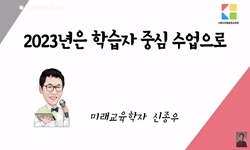The purpose of this study is to explore the structural relationship between learner-centered instruction and feedback experience and affective and cognitive achievement, focusing on instruction and assessment that emphasize student growth. A structura...
http://chineseinput.net/에서 pinyin(병음)방식으로 중국어를 변환할 수 있습니다.
변환된 중국어를 복사하여 사용하시면 됩니다.
- 中文 을 입력하시려면 zhongwen을 입력하시고 space를누르시면됩니다.
- 北京 을 입력하시려면 beijing을 입력하시고 space를 누르시면 됩니다.
https://www.riss.kr/link?id=A107266406
- 저자
- 발행기관
- 학술지명
- 권호사항
-
발행연도
2020
-
작성언어
-
- 주제어
-
KDC
370
-
등재정보
KCI등재
-
자료형태
학술저널
- 발행기관 URL
-
수록면
791-814(24쪽)
-
KCI 피인용횟수
0
- 제공처
-
0
상세조회 -
0
다운로드
부가정보
다국어 초록 (Multilingual Abstract)
The purpose of this study is to explore the structural relationship between learner-centered instruction and feedback experience and affective and cognitive achievement, focusing on instruction and assessment that emphasize student growth. A structural equation model analysis was conducted using data from the third year of the middle school panel of the Daegu Education Longitudinal Study. The results are as follows. First, learner-centered instruction and overall feedback had a positive effect on students affective achievement, but individual feedback had a negative effect on academic efficacy. Second, the higher the academic efficacy or the higher the happiness in school learning, the higher the mathematical competencies. Third, the direct effect of learner-centered instruction and overall feedback on mathematical competencies was not significant, but the direct effect of individual feedback was statistically significant. Fourth, looking at the indirect effects, the indirect effects of academic efficacy were all significant in the relationship between learner-centered instruction, overall feedback, and individual feedback and mathematical competencies. However, the indirect effect of happiness in school learning was significant only in the relationship between learner-centered instruction and overall feedback and mathematical competencies. Finally, the implications and limitations of this study were discussed.
참고문헌 (Reference)
1 박정, "형성평가와 평가의 객관성" 한국교육평가학회 31 (31): 483-499, 2018
2 손원숙, "현장 교사를 위한 효과적인 피드백 방법" 학지사 2020
3 정혜린, "혁신학교 중학생이 인식한 학습자 중심 수업방법, 학교 만족도의 궤적 및학교적응의 관계" 학습자중심교과교육학회 18 (18): 275-299, 2018
4 김아영, "학업적 자기효능감 척도 개발 및 타당화 연구" 39 (39): 95-123, 2001
5 이정화, "학업성취에 대한 피드백 효과의 메타분석" 한국아동교육학회 28 (28): 39-66, 2019
6 성귀복, "학습자질문중심 수업이 예비영어교사의 자기주도학습능력, 학업적 자기효능감 및 자아개념에 미치는 영향" 학습자중심교과교육학회 20 (20): 1425-1454, 2020
7 소연희, "학습자중심수업 인식과 대학생의 핵심역량과의 관계 - 학업도전의 매개효과를 중심으로 -" 한국자치행정학회 32 (32): 139-157, 2018
8 최승현, "학습자의 핵심역량 제고를 위한 교수학습 및 교사교육 방안 연구: 중학교 국어, 수학, 과학교과를 중심으로" 한국교육과정평가원 2011
9 정문주, "학습자가 인식한 교수자의 수업방식이 학업성취 향상요인 및 학업성취도에 미치는 영향" 한국청소년학회 22 (22): 129-150, 2015
10 박민애, "학습자 중심의 피드백 처리 과정 모형과 피드백 구하기의 조절효과 분석" 한국교육평가학회 33 (33): 377-400, 2020
1 박정, "형성평가와 평가의 객관성" 한국교육평가학회 31 (31): 483-499, 2018
2 손원숙, "현장 교사를 위한 효과적인 피드백 방법" 학지사 2020
3 정혜린, "혁신학교 중학생이 인식한 학습자 중심 수업방법, 학교 만족도의 궤적 및학교적응의 관계" 학습자중심교과교육학회 18 (18): 275-299, 2018
4 김아영, "학업적 자기효능감 척도 개발 및 타당화 연구" 39 (39): 95-123, 2001
5 이정화, "학업성취에 대한 피드백 효과의 메타분석" 한국아동교육학회 28 (28): 39-66, 2019
6 성귀복, "학습자질문중심 수업이 예비영어교사의 자기주도학습능력, 학업적 자기효능감 및 자아개념에 미치는 영향" 학습자중심교과교육학회 20 (20): 1425-1454, 2020
7 소연희, "학습자중심수업 인식과 대학생의 핵심역량과의 관계 - 학업도전의 매개효과를 중심으로 -" 한국자치행정학회 32 (32): 139-157, 2018
8 최승현, "학습자의 핵심역량 제고를 위한 교수학습 및 교사교육 방안 연구: 중학교 국어, 수학, 과학교과를 중심으로" 한국교육과정평가원 2011
9 정문주, "학습자가 인식한 교수자의 수업방식이 학업성취 향상요인 및 학업성취도에 미치는 영향" 한국청소년학회 22 (22): 129-150, 2015
10 박민애, "학습자 중심의 피드백 처리 과정 모형과 피드백 구하기의 조절효과 분석" 한국교육평가학회 33 (33): 377-400, 2020
11 박만구, "학습자 중심의 수학 수업에서 교사의 발문 분석" 한국학교수학회 9 (9): 425-457, 2006
12 윤정은, "학습자 중심 수업에서의 교사의 역할 탐색-국내 수학교육 연구를 중심으로-" 학습자중심교과교육학회 15 (15): 45-68, 2015
13 김신영, "학생평가에 대한 교사의 인식과 실천" 한국교육평가학회 27 (27): 141-161, 2014
14 배주현, "학생이 지각한 수업환경, 수업 및 평가실제와 정의적 성취와의 관계: PISA 2015 과학 자료" 한국교육과정평가원 21 (21): 131-154, 2018
15 박민애, "학생용 피드백 리터러시 척도(FLSS) 개발 및 타당화" 한국교육평가학회 32 (32): 473-495, 2019
16 이빛나, "피드백 효과에 대한 메타분석: 피드백, 학습과제 및 학습자 특성에 따른 차이" 한국교육평가학회 31 (31): 501-529, 2018
17 손원숙, "탐구기반 과학수업 프로파일의 분석: PISA 2015 한국과 싱가포르 비교" 교과교육연구소 21 (21): 698-707, 2017
18 박민애, "초등 교실수업에서의 학습을 위한 평가와 정의 및 인지적 성취와의 관계" 한국초등교육학회 30 (30): 21-42, 2017
19 손원숙, "초·중학교 교실평가 실제와 학생의 정의 및 인지적 성취 간의 관계: TIMSS 2011 한국, 싱가포르 및 핀란드" 한국교육평가학회 27 (27): 1337-1359, 2014
20 남인수, "체육교사의 교수행동과 피드백이 중학생의 자기효능감 및 과제지속성에 미치는 영향" 학습자중심교과교육학회 19 (19): 513-530, 2019
21 성태제, "인지진단이론과 컴퓨터화 검사를 이용한 형성평가 피드백이 수학 학업성취도와 정의적 특성에 미치는 영향" 한국교육평가학회 32 (32): 1-25, 2019
22 윤정일, "인간 능력으로서의 역량에 대한 고찰 : 역량의 특성과 차원" 한국교육학회 45 (45): 233-260, 2007
23 길혜지, "역량중심 교육과정의 핵심요소가 중학생의 역량에 미치는 영향 분석" 한국교육학회 56 (56): 289-315, 2018
24 홍원표, "역량기반 교육과정의 현장 적용 방안 연구:캐나다 퀘벡의 사례를 중심으로" 한국교육과정학회 29 (29): 67-86, 2011
25 신동로, "쓰기를 활용한 교수학습 방법과 교정적 피드백이 수학 학업성취도와 자기효능감에 미치는 영향" 한국교육방법학회 19 (19): 123-142, 2007
26 전경희, "수학과 정의적 성취 특성의 잠재프로파일 분석" 한국교육과정평가원 22 (22): 319-339, 2019
27 김선희, "수학과 교육과정에 반영된 핵심역량의 국제적 동향 탐색" 한국수학교육학회 54 (54): 65-81, 2015
28 교육부, "수학과 교육과정"
29 권성연, "대학수업의 질 제고를 위한 학습자중심교육의 중요도와 실행도 분석 : 교수들의 인식을 중심으로" 학습자중심교과교육학회 11 (11): 51-78, 2011
30 진미석, "대학생 핵심역량으로서의 한국어 의사소통역량 진단과 특성" 2014 : 211-237, 2014
31 조영민, "교실평가에 대한 고등학생의 인식 유형 분석" 한국교육과정평가원 21 (21): 197-217, 2018
32 김준호, "교수자의 형성평가 피드백, 학업적 자기조절, 피드백 수용성, 피드백 활용능력이 학업성취도에 미치는 영향" 학습자중심교과교육학회 20 (20): 899-918, 2020
33 김난옥, "교사의 특성과 피드백이 초등학생의 정의적, 인지적 성취에 미치는 영향" 한국교육과정평가원 21 (21): 129-151, 2018
34 노현종, "교사의 숙제 피드백이 학생의 자기조절학습, 과제가치, 학습태도 및 학업성취도에 미치는 영향" 한국교육평가학회 28 (28): 879-902, 2015
35 장지윤, "교사의 수업방식과 숙제 피드백이 학생의 수업태도, 수업 분위기, 만족도, 자기주도학습, 학업성취도에 미치는 영향: 국어, 수학, 영어 교과 중심으로" 과학교육연구소 57 (57): 246-259, 2018
36 지은림, "교사의 수업 및 평가활동이 학생들의 자기조절학습과 학업성취도에 미치는 영향" 한국초등교육학회 24 (24): 165-184, 2011
37 황윤희, "교과 역량 신장을 위한 수업과 평가 개선에 대한 수학 교사들의 인식과 요구" 대한수학교육학회 28 (28): 651-669, 2018
38 이태경, "공업계열 고등학교 교사의 학습을 위한 평가실제와 학교의 학업낙관성과의 관계: 교사의 평가자율성, 평가효능감 및 평가태도의 매개효과" 사범대학부속중등교육연구소 66 (66): 525-550, 2018
39 김동욱, "고등학교 과학 교과 수업의 질과 정의,인지적 성취와의 관계 : PISA 2015" 한국교육평가학회 31 (31): 729-752, 2018
40 최희선, "고등학교 '수학'교과서에 제시된 교과 역량 과제 분석" 한국학교수학회 22 (22): 95-113, 2019
41 Pat‐El, R. J., "Validation of assessment for learning questionnaires for teachers and students" 83 (83): 98-113, 2013
42 Brown, G. T. L., "Understanding Chinese university student conceptions of assessment : cultural similarities and jurisdictional differences between Hong Kong and China" 19 : 151-173, 2016
43 Elen, J., "Student-centered and teacher-centered learning environments : What students think" 12 (12): 105-117, 2007
44 Anderson, J. C., "Structural equation modeling in practice : A review and recommended two-step approach" 103 (103): 411-, 1988
45 McMillan, J. H., "SAGE handbook of research on classroom assessment" SAGE Publications, Inc 2013
46 Kline, R. B., "Principles and practice of structural equation modeling" Guilford publications 2015
47 Brookhart, S. M., "How to give effective feedback to your student" ASCD 2017
48 Rychen, D. S., "Highlights from the OECD Project definition and selection competencies: theoretical and conceptual foundations (DeSeCo)" 2003
49 Shute, V. J., "Focus on formative feedback" 78 (78): 153-189, 2008
50 Ferris, D., "Feedback in Second Language Writing: Contexts and Issues (Cambridge Applied Linguistics)" Cambridge University Press 81-104, 2006
51 Cheung, G. W., "Evaluating goodness-of-fit indexes for testing measurement invariance" 9 (9): 233-255, 2002
52 OECD, "Definition and selection of competencies: Theoretical and conceptual foundations, DeSeCo. Summary of the final report: Key Competencies for a successful life and a well- functioning society"
53 Stiggins, R. J., "Assessment crisis : The absence of assessment for learning" 83 (83): 758-765, 2002
54 Black, P., "Assessment and classroom learning" 5 (5): 7-74, 1998
55 Moss, C. M., "Advancing formative assessment in every classroom: A guide for instructional leaders" ASCD 2009
56 박경미, "2015 개정 수학과 교육과정 시안 개발 연구" 한국과학창의재단 2015
57 황혜정, "2015 개정 수학 교과서에 반영된 창의․융합 역량 요소 탐색– 중학교 1학년 그래프 단원을 중심으로 -" 한국수학교육학회 32 (32): 477-493, 2018
58 교육부, "2015 개정 교육과정 총론 및 각론 확정․발표. 교육부 보도자료"
동일학술지(권/호) 다른 논문
-
정렬법을 적용한 학생 스트레스 척도의 측정 동일성 검증 및 잠재평균 분석
- 한국교육평가학회
- 노재희(Jaehee Rho), 류지훈(Ji Hoon Ryoo)
- 2020
- KCI등재
-
- 한국교육평가학회
- 정혜진(Jung Hyejin), 지은림(Chi Eunlim)
- 2020
- KCI등재
-
- 한국교육평가학회
- 권순달(Soon-Dal Kwon)
- 2020
- KCI등재
-
- 한국교육평가학회
- 김경희(Kyunghee Kim)
- 2020
- KCI등재
분석정보
인용정보 인용지수 설명보기
학술지 이력
| 연월일 | 이력구분 | 이력상세 | 등재구분 |
|---|---|---|---|
| 2026 | 평가예정 | 재인증평가 신청대상 (재인증) | |
| 2020-01-01 | 평가 | 등재학술지 유지 (재인증) |  |
| 2017-01-01 | 평가 | 등재학술지 유지 (계속평가) |  |
| 2013-01-01 | 평가 | 등재학술지 유지 (등재유지) |  |
| 2010-01-01 | 평가 | 등재학술지 유지 (등재유지) |  |
| 2008-01-01 | 평가 | 등재학술지 유지 (등재유지) |  |
| 2006-01-01 | 평가 | 등재학술지 유지 (등재유지) |  |
| 2004-01-01 | 평가 | 등재학술지 유지 (등재유지) |  |
| 2001-01-01 | 평가 | 등재학술지 선정 (등재후보2차) |  |
| 1998-07-01 | 평가 | 등재후보학술지 선정 (신규평가) |  |
학술지 인용정보
| 기준연도 | WOS-KCI 통합IF(2년) | KCIF(2년) | KCIF(3년) |
|---|---|---|---|
| 2016 | 0.91 | 0.91 | 0.99 |
| KCIF(4년) | KCIF(5년) | 중심성지수(3년) | 즉시성지수 |
| 1.02 | 1.03 | 1.646 | 0.37 |




 스콜라
스콜라






